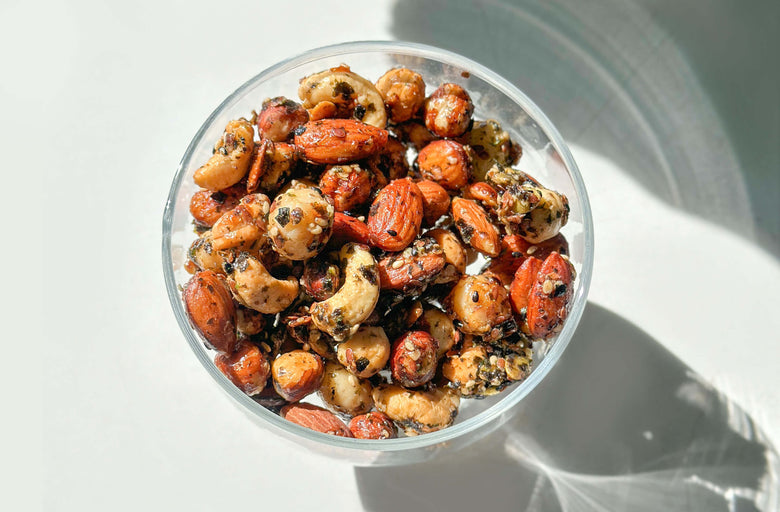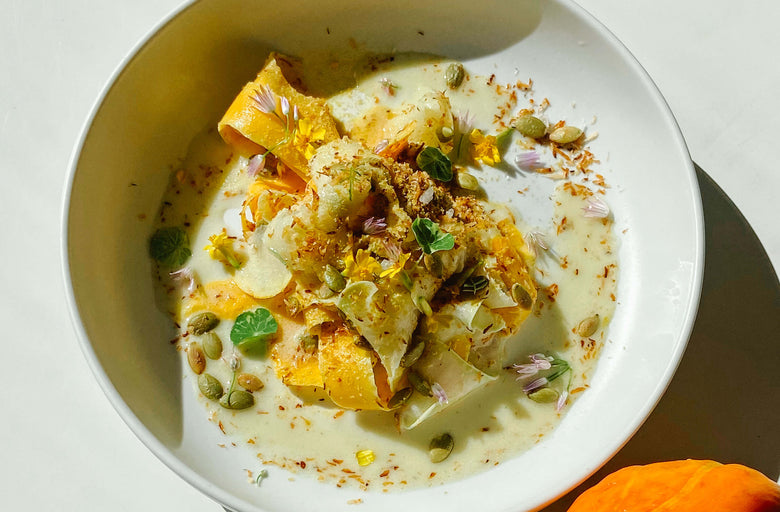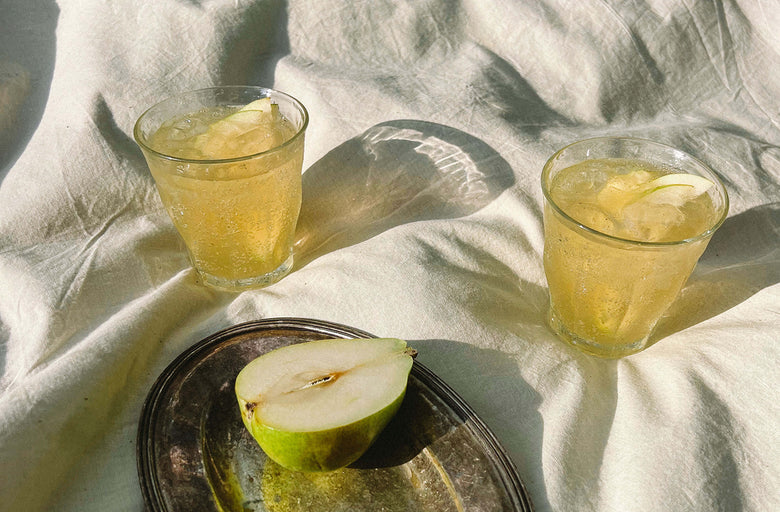Dr. Aviva Romm is a woman whisperer. Her insight is the result of decades as a midwife, MD, herbalist, ecologist, author, and if that’s not a full-enough resume—mother of four. When we have questions about our ever-evolving bodies, we pick Dr. Romm’s brain. Her advice is no-nonsense, empowering, and rooted deeply in the food-is-medicine philosophy; after all, her understanding of body and fertility synergy was a key reason we tapped her to help us create Level II, our expert-level whole food detox. She continues to show us how nourishment in all its forms puts us in the driver’s seat of preventative health.
Each of us is on our own journey as a woman. And we often receive questions from our clients (and around Sakara HQ) about the inherent link between nutrition and hormone health. Someone will often say, “Let’s call Dr. Romm.” So we turned to her for some guidance on eating for optimal hormone health, no matter your life stage. “How we eat can directly affect whether we're producing enough hormones, and if we are producing them in the right ratio,” says Dr. Romm. This balance influences our emotions, our relationships, and our overall mindset. Here, she reveals how sweeping away the static (negative energy, junk food, unhealthy bonds) can reveal our most powerful body, primed to carry us through life’s most significant moments.

When someone is interested in conceiving, what do you suggest they do to create "fertile ground" and prep their bodies for pregnancy?
“The precursor of what makes estrogen, progesterone, testosterone, cortisol, and many other hormones is cholesterol. And the only way to have that is to get enough fat in our diet. We also need iodine, which is critical for thyroid function. Our endocrine system, as women, is so dependent on healthy thyroid function. Our ovaries use, as do our adrenals, an enormous amount of vitamin C, for example. Our ovaries require selenium for healthy functioning, as well as melatonin. When we’re not getting enough nutrition, our body goes into survival mode. It goes into this fight or flight response. And one of the things that happens is that it puts a simmer on our reproductive function.”
LISTEN TO YOUR BODY: “Being a woman should not mean that you're suffering, ever. Your body's not meant to make you suffer. And some women have a menstrual cramp now and then. But a lot of women are struggling with really intense period pain every month, or irregular periods, endometriosis, or PCOS. As a culture, for thousands of years, we've treated women's pain as normal. Women either tend to suck it up and not talk about it, or they just go on the pill or take medications every month for the pain. We've taken all these things and ignored or suppressed them because we were told they were normal.”
HEAL THE VAGINA: “You can alter your gut and your vaginal microbiome with your diet—opting for an array of all phytonutrients, antioxidants, greens, lots of rainbows vegetables, and eating organic as much as possible so that you’re not getting pesticides, herbicides, and antibiotics. If your microbiome isn't really healthy, then you tend to have more inflammation, more risk of chronic inflammation, even auto-immune disease, which in turn affects your fertility. Women with chronic pelvic pain, which is shockingly common, are more likely to have a disrupted vaginal microbiome—symptoms like painful periods, endometriosis, pelvic pain, fertility problems, and painful sex. But studies have shown that working to help improve women's vaginal microbiome can actually increase their chances of getting pregnant with IVF and other reproductive technologies."
MIND YOUR MICROBIOME: "Our bodies are so resilient. They simply need the right nourishment. Strong studies have suggested that even in three days you can make or break your microbiome. If you are somebody who eats a standard American diet, and you switch to foods that are very rich in prebiotics and probiotics, like lots of fiber, fermented foods, and really good quality fats, and you get rid of the junk food, which tends to feed unhappy, unhealthy flora, you can transform your microbiome. I think we need to give ourselves permission for self-care and eating well, because we deserve it, not just because we might someday become pregnant.”
GO DEEPER THAN DIET: “Along with diet, evaluate your self-care regimen, rest, your relationships (are they self-respecting, are you treated well), getting on board with really identifying what a healthy sexual relationship is for you.”

Once you are pregnant, what nourishment makes for healthy mamas and babies?
“The main thing that changes by trimester is really just folate, or folic acid. I usually recommend taking methylfolate for anyone in their child-bearing years. Herbs that are good to know about include ginger for nausea; red raspberry leaf tea, starting in the second trimester for uterine support, rich in magnesium; nettle leaf infusion for ample nutrient support, adjunct to your multivitamin; and echinacea for cold and flu season. Then, from a dietary perspective, if you're having constipation later in pregnancy, you’ll want to increase your plant fiber.”
I think we need to give ourselves permission for self-care and eating well, because we deserve it, not just because we might someday become pregnant.
CRAVINGS? ASK THE HARD HITTING QUESTIONS: “Cravings for things that aren't particularly healthy, like ice cream, sugary things, or white flour carbs, that's a really good time to ask, ‘All right, what's my body missing? Or what am I missing?’ It may be that you're anxious because you're pregnant. It’s a new thing and you're going for comfort foods that are familiar to you. Maybe you're not sleeping well at night and you're craving more sugar during the day because you're tired. If you're vegan and you're suddenly craving ice cream, or even if you're not a vegan, do you need more fat? Do you need more calcium? Do you need more energy?”
CHOOSE ORGANIC: “This is an important time to invest in organic, because what we get exposed to in the environment, we're direct-downloading to our babies. Any time you’re able to afford organic, that would be great. If you are eating meat, dairy, or any animal fat, they should absolutely come from organic animals. I don't recommend bone broth in pregnancy unless you know that that bone broth is not contaminated with any heavy metals, because bones in animals accumulate environmental heavy metals. Keep fish to the low mercury fish. Look at the NRDC, Natural Resource Defense Council, or Monterey Bay Aquarium, for low-mercury fish and follow the fish guidelines on how much to eat while pregnant.”
TASTE EVERYTHING (OR NOT): “Pregnancy can do weird things to our taste buds. There is actually some research that shows our babies develop their taste buds during pregnancy from what mom's eating. A little bit gets in the amniotic fluid and they can sense that. Eat broadly while you're pregnant. Certainly, the more diverse our diet is, the more healthy our microbiome is, the more nutrients we're likely to be getting. That said, if it's first trimester, or first into early second, and all you can eat is organic chicken nuggets and pasta, you got to go with it, right? Ideally, then, you'd make sure you're taking your prenatal.”
What are your strategies for breastfeeding moms?
“You're going to be really hungry. It takes a lot of energy to produce breast milk. And this is definitely a time when restricting carbs is not a great idea. So, traditionally, people ate a lot of stews, things like barley stew. Eating buckwheat, whole grains or grain-like seeds has traditionally been a part of helping moms to improve their breast milk. In places as far as from Eastern Europe to far China, this is what women did. You can actually get alcohol-free beer that has the hops, grain, and the calories that can help build up your milk a little extra that might be helpful. Also, eating more warm foods—broths, stews, soups, rice bowls—has been classically considered a part of helping to support breast milk.”
LET GO OF POST-BABY BODY STRESS: “A lot of times in the wellness world, [they’ll make rules like] not eating after 7:00. If you're hungry at 10:00, eat. Because you're going to be producing milk through the night. It's not like breast milk production is on a schedule. It's not 9 to 5. My midwife teacher used to say, ‘you're still under heavy construction at night.’ So, let yourself eat more liberally. If you need a larger portion than usual, eat a larger portion. Listen to your body, and let it guide you. Don't worry about your weight. Because if your thyroid is normal, if everything's normal, breastfeeding will pull that weight off of you if you're just eating healthfully.”
When someone is entering a pre-menopausal phase, how can they do so with grace and vibrancy?
“Estrogen has a huge influence on our sense of well-being, and so does progesterone. So as those go down, it can affect our sleep, it can affect our mood, what we crave and choose to eat. We have three different kinds of estrogen. Most of our lives, we're producing something called estradiol, that's e2, the strongest kind of estrogen. It's the kind that if you have too much of it, you can experience uncomfortable breast symptoms or heavy periods. Then, when we're pregnant, we down-regulate how much estradiol we're producing and we start producing more of something called estriol, that's e3. And that has some different effects on us, too. When we switch from our regular life cycles and into menopause, the production of e2 goes dramatically down and we produce something called estrone, e1. And estrone, for one, doesn't provide as much of that cushiony, emotional, juicy thing that we associate with being women. When that e2 goes down, women can have more vaginal dryness, irritability, headaches, mood swings, and sleep problems. So, as we go into perimenopause, not only are we not sleeping as well, but we're going through identity changes as women. You go through as many identity changes going into perimenopause as you do becoming a mother. It's not something anybody really talks about enough.”
PROMOTE JUICY-NESS: “Keeping your ovaries healthy can actually keep your ovum healthy longer. So nutritional deficiency and other factors can definitely push you into earlier menopause—you want to focus on reducing inflammation and oxidative stress. This is really an important time in life to get lots of antioxidant nutrients, meaning fruits and veggies, and including lots of good fats. This is a time when alcohol can be your worst enemy, because it can trigger hormonal changes. I take a month off here and there on the alcohol. But one thing I recommend having every day: flaxseed. I recommend adding two tablespoons of fresh ground flaxseed every day for women who are menopausal and perimenopausal.”
You go through as many identity changes going into perimenopause as you do becoming a mother. It's not something anybody really talks about enough.
SEEK COMMUNITY: “Like with so many parts of our life cycles, talking with other women who are your age and going through these changes can be life-saving. Reading books that are humorous about menopause is always a good way to go. Spend more time on media platforms that are age-positive, that are honoring beauty at all ages and stages. Not just if you're 22, and yoga-fit, perfect-looking, and blonde. I think that ceremony, ritual, journaling, and being really honest with yourself are all really important. Take a step back, and ask how you can be the happiest version of you.”
More Women’s Health Advice:






